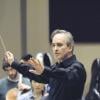
Few of us have experienced a truly Faustian struggle between different sides of our nature: For that we turn to operatic characters. We have “to vax or not to vax.” They have “to love carnally or spiritually.” Well, the love dichotomy may not weigh heavily on peoples’ minds now, but it is the central obsession of the hero in Tannhäuser, Richard Wagner’s four-hour opera that runs Oct. 16 – Nov. 6 at the Dorothy Chandler Pavilion, with two livestreamed performances on tap for Oct. 24 and 27.
Originally premiered in Dresden in 1845, but heavily revised in 1861, the work is one of Wagner’s most popular scores. Its memorable, soaring melodies are occasionally swoon-worthy. This production, first seen at Los Angeles Opera in 2007, after its Salzburg Festival debut, was originally directed by Ian Judge; Louisa Muller helmed the revival.

Unfortunately, the staging misfires on several levels. Getting off to a clumsy start, Tannhäuser (tenor Issachah Savage) is initially seen caressing a grand piano at the side of the stage, we’re not sure why. Then there were the sets by Gottfried Pilz: revolving walls of large doors resembled the glass elevators at the Bonaventure Hotel, with lighting design by LAO newcomer Marcus Doshi doing little more than making use of intense reds and greens, the mostly black-and-white third act notwithstanding.
In the Act I ballet, the usually deft choreographer Azure Barton, who is also making her LAO debut, took flailing arms, rhythmic slithering, and awkward partnering to new heights in the eroticized realm of Venusberg. This was a decidedly different approach than in 2007, where dance was replaced by an orgy.
There have been numerous updatings of Tannhäuser, with a 2019 mounting in Bayreuth by Tobias Kratzer featuring the minstrel as clown, his Citroën-driving Venus foraying to a Burger King and a cast that included drag queen, Le Gateau Chocolat. On the über-offensive side, Burkhard Kosminski’s 2013 production for Deutsche Oper am Rhein in Dusseldorf, Germany, featured swastika-festooned costumes and a set reminiscent of a gas chamber. That production, roundly booed, was, needless to say, cancelled shortly thereafter.

Though in LAO’s current outing there were no such outlandish choices, it has a foot in both the traditional and updated camps. The production feels both nether-worldish and anachronistic. Pilz’s costumes — suits for the men, who looked more like Elks Lodge members gone amok, a standard-fare robed and hooded “Pilgrim’s Chorus” and gowns for the gals (additional costuming by Misty Ayres), topped by a black-and-white ball-cum-crooning contest comprising Act II. (The lustful terpsichores of Act I were in work-appropriate attire: filmy and flowy.)

This neo-dystopian world did little to advance the story: a minstrel-knight returns home after a long erotic entrapment with the goddess Venus (mezzo-soprano Yulia Matochkina, in her LAO debut), so that he may pursue a more virtuous path. Of course, the singer’s argumentative confession of his adventure not only stuns the court but also leaves him in no position to gain the affections of the virginal Elisabeth (soprano Sara Jakubiak, also making her company debut).
Savage’s singing of the exhausting lead grew more secure as the opera progressed but he didn’t seem entirely comfortable in the role. Opposite Savage, Matochinka thrilled with clarion tones. Jakubiak, while being appropriately girlish at times, sang potently, including a near-explosive “Dich, teure Halle,” while Erica Petrocelli as The Voice of the Shepherd, was in fine form.

With a singing contest at the center of the opera, the minnesingers, these FOTs — fellow knights/friends of Tannhäuser — ruled: Baritone Lucas Meachem proved a formidable Wolfram, the one cavalier who doesn’t turn against the hero, his gentle, “Song to the Evening Star” a highlight; the always fine bass Morris Robinson comported himself well as the Landgrave (local ruler) Hermann and also served as the embodiment of the Pope. Adding to the testosterone quotient were tenors Robert Stahley as Walther von der Vogelweide and Anthony Ciaramitaro as Heinrich der Schreiber. Bass-baritones Philip Cokorinos and Patrick Blackwell gave Biterolf and Reinmar, respectively, some heft.
The third act opens with an orchestral prelude describing Tannhäuser’s pilgrimage. He’s been to Rome, but is refused papal forgiveness. Elisabeth prays that her soul be received in heaven, her dead body soon brought back onstage. Venus makes a brief appearance in a failed attempt to lure Tannhäuser back, before he collapses and dies, calling out “Holy Elisabeth, pray for me” by the corpse of his beloved. A chorus of children finally recounts a miracle: the Pope’s staff has sprouted greenery, redemption rules, and Elisabeth becomes a local saint.

The whole production would fall flat without the orchestra’s brilliance and the stamina of James Conlon, now in his 16th season as music director. What a sound they produced as he artfully articulated the pulsating lines of the score. The brass reverberated throughout the theater, while the strings were especially enthralling. Also impressive and never less than engaging was JoAnn Turovsky in her beautifully-plucked harp solos. Kudos, too, to outgoing chorusmaster Grant Gershon and the marvelous LAO chorus, again showing their musical mettle But it’s Conlon’s vision that makes the show work on a musico-dramatic level. “To my mind,” he writes in the program, “by experiencing this drama in the opera house, we actually live a part of the ‘optimistic’ version of romanticism to which [noted political, philosopher and historian of ideas Isaiah] Berlin refers and allow our ‘infinite nature to soar.’”





